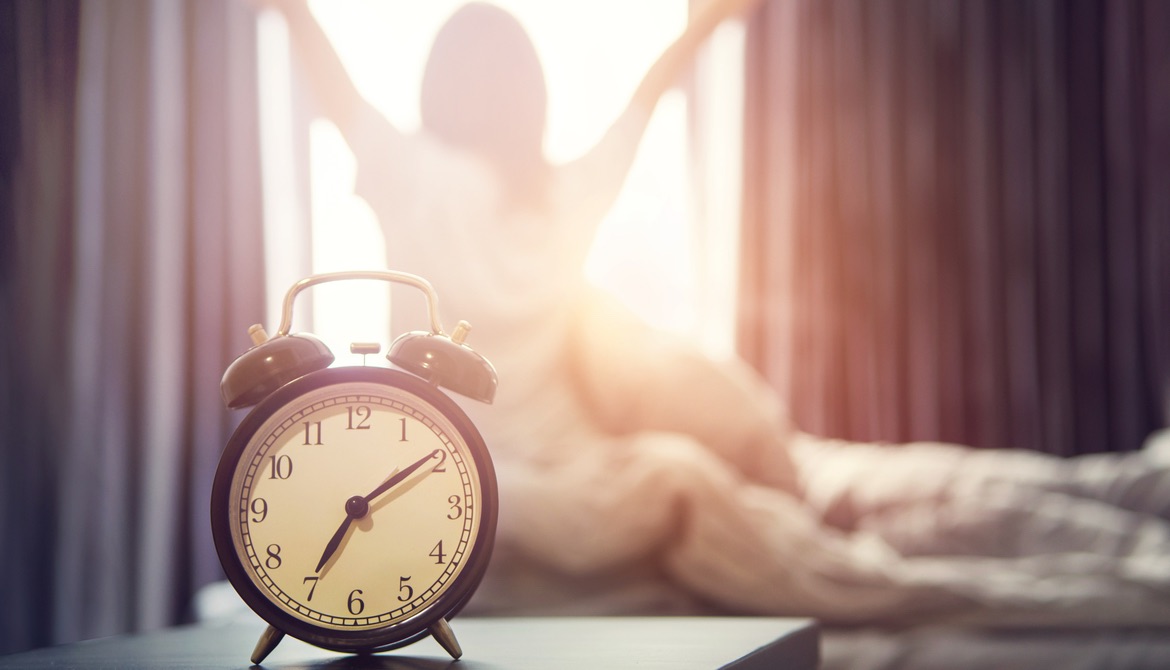5 minutes
Taking a moment to center yourself helps boost the rest of your day.
I used to sleep until the last possible second (after snoozing the alarm a couple of times, of course) and then get up and sprint through my morning routine. I pretty much had it timed to the minute so that I could get to the office at an acceptable time without drawing attention.
I've never been a morning person, or so I thought. Before I got married, my typical weekday schedule was waking up around 7:30 a.m. and dozing off around 11:15 p.m. as I watched Friends. My morning routine consisted of showering, dressing and grabbing a breakfast Hot Pocket as I dashed out the door. (Don't judge.) On the weekends, I would go out with friends or binge watch movies until the wee hours of the morning and sleep until 11 a.m. or noon the next day.
When I met my husband 10 years ago, my comfortable schedule was interrupted. Rino typically gets up at 4:00 a.m. (That is not a typo.) On the weekends, he would wake me up at 8:00 a.m. Before long, I was going to sleep by 10:00 p.m. and waking up at 7:00 a.m.
About two years ago, I was complaining that I didn't have enough time to myself. Rino suggested I start getting up earlier to have some time in the morning. We had a newborn baby and two other children under five. The thought of waking up early was not appealing to me, yet I craved that personal time. I decided to experiment with getting up one hour earlier—at 6:00 a.m. That experiment has turned into a daily habit that helps me jump-start my day and feel calm and productive.
I've been studying successful people for years, and over and over again, the morning routine turns up as a habit of the super successful.
Below are the most common elements in morning routines based on my research. The routines last anywhere from one to three hours (for those super early risers up at 4:00 a.m.) and take place before they even get to the office.
Meditation: In his book, Tools of Titans, Tim Ferriss shared that 80 percent of the highly successful people he interviewed meditate at least once a day. In my research, meditation came up repeatedly. Organizations like Aetna, Google and Apple all offer meditation classes to their employees. Since I pretty much feel a sense of urgency almost every minute of the day, I never thought I would be able to meditate (or at least do it well). But I started meditating a year and a half ago, and I have seen an improvement in my focus, patience and calmness. I meditate most days for 20 minutes in the morning. The bottom line: Those who meditate report that they are able to keep calm and handle the stresses of life better.
Prayer or reflection: Taking time in the morning to be grateful, pray or set an intention for the day is typical for those who are very successful. Most report that this practice keeps them centered. Personally, I set an intention for my day to go well, and I visualize everything on my schedule—whether a presentation, a workshop or a meeting—going exactly as I want. I pause before each segment of my day and make an intention to be present and connected to the person or people I am with.
Planning: Successful people are deliberate about how they spend their time. They don't rush into the day and let others overtake their schedule. Most successful people report spending time in the morning planning their day. I recommend taking this a step further and planning your day the night before. This allows you to jump right into your most important priorities instead of wasting time looking at your long task list and feeling overwhelmed (and then procrastinating by going on Facebook, looking at your credit union account, etc.) Pick your top two priorities, and schedule them in your calendar. In the morning, review your priorities list and get into action.
Exercise: Many successful people exercise in the morning, reporting that getting it done at the beginning of the day gives them energy and ensures it's a priority.
Check email: You may be surprised that about half of the successful people studied report checking email first thing in the morning. (Or maybe you are not surprised since it's the first thing most people do.) Most report scanning through their email and not reading or responding. Although most experts advise not checking email in the morning, I find that unrealistic. The point is to not get engrossed in emails and let it derail your day.
Although they have common elements, the routines of these highly successful people were not all the same, so the key is to create a routine that resonates with you. Whether it's reviewing your priorities list, reading an inspirational quote, or making a cup of tea, taking a few minutes to center yourself in the morning can help you to be more mindful as you go through your day.
If you want some further reading on morning routines, below are a couple of articles:
The Morning Routines of the Most Successful People
The Morning Routines of 12 Successful Women
I also recommend the book, The Miracle Morning by Hal Elrod.
I'd love to hear from you. Do you have a morning routine? What practices help you to set your day up for success?
Laurie Maddalena, MBA, CPCC, PHR, is a certified executive coach, leadership consultant and founder of Envision Excellence, LLC in the Washington, D.C., area. Her mission is to create exceptional cultures by teaching leaders how to be exceptional. Maddalena facilitates management and executive training programs and team-building sessions and speaks at leadership events. Prior to starting her business, she was an HR executive at a $450 million credit union. Contact her at 240.605.7940 or lmaddalena@envisionexcellence.net.










